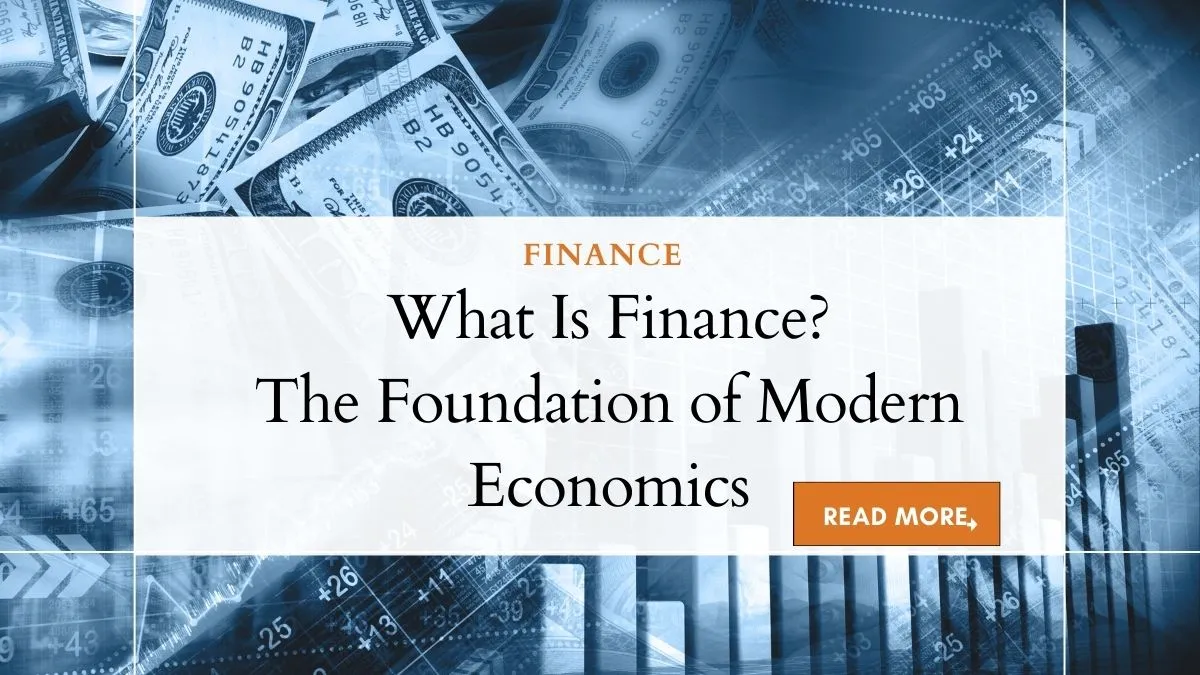
In today’s rapidly evolving world, the term ‘finance’ reverberates in boardrooms, households, and marketplaces alike.
But “What Is Finance?” and why does it hold such paramount importance in our daily lives? This article delves deep into the heart of finance, unraveling its multifaceted nature and exploring its foundational role in shaping modern economics.
From personal savings to global economic strategies, we’ll embark on a journey to understand the essence of finance and its profound impact on our world.
Also, you can able to know,
The Basics of Finance
Diving into the world of finance, one must first grasp its foundational concepts.
From the very essence of money to the intricate workings of financial markets, understanding these basics is akin to learning the alphabet before forming sentences.
This section sheds light on the fundamental elements that shape the financial landscape, setting the stage for deeper exploration.
Exploring the Concept of Money
Money, in its simplest form, is a medium of exchange. It allows us to trade goods and services without the need for barter.
Over time, money has also become a store of value, enabling us to save and invest.
From ancient coins to digital currencies, the concept of money has evolved, reflecting societal changes and technological advancements.
Introduction to Financial Markets
Financial markets play a pivotal role in the economy, facilitating the exchange of assets like stocks and bonds.
These markets can be divided into primary markets, where new securities are issued, and secondary markets, where existing securities are traded.
They provide businesses with capital and offer investors opportunities to grow their wealth.
Key Players in Finance
The financial landscape is populated by various players, including individuals, businesses, and governments.
While individuals save and invest, businesses seek capital for expansion. Governments, on the other hand, regulate financial activities to ensure stability and fairness.
The dynamic between savers, borrowers, investors, and regulators shapes the financial ecosystem.
Personal Finance: Managing Your Money Wisely
Personal finance is the art and science of managing one’s own financial resources.
It’s a journey that begins with earning one’s first paycheck and continues throughout life, encompassing everything from daily spending habits to long-term investment strategies.
In this section, we delve into the tools and techniques that can help individuals navigate their financial journey with confidence and foresight.
Budgeting and Financial Planning
A budget is a financial blueprint, guiding our spending and saving decisions.
By setting clear financial goals and tracking expenses, we can optimize our financial health and avoid unnecessary debts.
Saving and Investing
While saving involves setting aside money for future use, investing aims to grow that money.
Investment vehicles like stocks offer higher returns but come with greater risks.
Bonds and mutual funds provide alternatives, catering to different risk appetites.
Credit and Debt Management
Credit can be a powerful tool when used wisely. It can help in acquiring assets like homes and cars.
However, mismanagement can lead to debilitating debts. Being informed about interest rates, credit scores, and repayment strategies is essential to maintain financial health.
Corporate Finance: The Business Perspective
Businesses, whether small startups or multinational giants, operate in a world driven by financial decisions.
Corporate finance delves into how companies manage their financial resources, make investment decisions, and strategize for growth.
This section offers a glimpse into the financial gears that keep businesses running and the strategies that drive their success.
Financial Statements and Analysis
Financial statements provide a snapshot of a company’s financial health.
By analyzing income statements, balance sheets, and cash flow statements, stakeholders can gauge a company’s profitability, liquidity, and solvency.
Capital Structure and Financing Decisions
Businesses require capital to operate and grow. They can raise this capital through equity (shares) or debt (loans).
The mix of debt and equity, known as the capital structure, influences a company’s risk and return profile.
Risk Management and Financial Planning
Businesses face myriad risks, from market fluctuations to operational challenges.
Effective risk management strategies, like hedging, can mitigate potential losses.
Financial planning ensures that businesses remain sustainable in the long run.
Public Finance: Government and the Economy
Governments play a pivotal role in shaping the economic landscape. Through policies, budgets, and interventions, they influence everything from inflation rates to employment opportunities.
Public finance provides insights into how governments manage their resources and the impact of their financial decisions on the broader economy.
In this section, we’ll explore the intricate dance between government actions and economic outcomes.
Government Budgeting
Governments collect revenues (taxes) and incur expenditures (public services).
The difference between these two, whether a deficit or surplus, impacts the economy. High deficits can lead to increased national debts.
Monetary Policy and Central Banking
Central banks, like the Federal Reserve, manage a country’s money supply and interest rates.
By adjusting these levers, they influence inflation, employment, and economic growth.
International Finance and Trade
In today’s interconnected world, international finance plays a pivotal role.
Exchange rates, trade balances, and foreign investments influence national economies and global economic trends.
Financial Institutions and Services
Behind every financial transaction, there’s an intricate web of institutions facilitating the process.
From the banks where we deposit our salaries to the insurance companies that protect our assets, these entities form the backbone of the financial system.
This section delves into the diverse world of financial institutions and the myriad services they offer, highlighting their significance in our daily lives.
Commercial Banks
Commercial banks offer a range of services, from accepting deposits to granting loans.
They play a crucial role in the economy, facilitating transactions and providing liquidity.
Investment Banks and Capital Markets
Unlike commercial banks, investment banks assist in raising capital for businesses.
They play a key role in mergers, acquisitions, and the issuance of securities.
Insurance and Risk Transfer
Insurance provides a safety net against unforeseen events. From health to property insurance, these products transfer risks from individuals to institutions, providing peace of mind.
Financial Planning for Life Events
Life is a series of milestones, each bringing its own set of financial challenges and opportunities.
Whether it’s planning for higher education, preparing for retirement, or managing wealth, proactive financial planning can make the journey smoother.
In this section, we’ll explore strategies and considerations for key life events, ensuring that one is financially prepared for every twist and turn.
Planning for Education Expenses
Higher education can be expensive. Planning ahead, exploring scholarships, and understanding financial aid options can ease the financial burden.
Retirement Planning
Retirement may seem distant, but early planning is crucial. By investing in retirement accounts like 401(k)s, individuals can ensure a comfortable future.
Estate Planning and Wealth Management
Estate planning ensures that one’s assets are distributed as per their wishes after their demise.
Wealth management strategies optimize the growth and distribution of wealth.
FAQs
The realm of finance, with its intricate nuances and vast scope, can often seem daunting.
However, a deeper dive reveals a structured world that impacts every facet of our lives, from personal decisions to global economic trends.
To help clarify some of the concepts discussed in our recent article on the foundation of modern economics, we’ve compiled a set of questions and answers.
These aim to provide a concise overview and address some common queries about the subject.
What is the primary distinction between personal finance and corporate finance?
Personal finance pertains to the management of an individual’s financial resources, encompassing daily spending habits and long-term investment strategies. In contrast, corporate finance delves into how companies manage their financial resources, make investment decisions, and strategize for growth.
How do financial markets facilitate economic growth?
Financial markets play a pivotal role in the economy by facilitating the exchange of assets like stocks and bonds. They provide businesses with the capital needed for expansion and offer investors opportunities to grow their wealth, thereby driving economic growth.
Why is it essential for governments to manage their financial resources effectively in public finance?
Effective management of financial resources by governments influences everything from inflation rates to employment opportunities. Through policies, budgets, and interventions, governments can shape the economic landscape, ensuring stability and fostering growth.
What role do commercial banks play in the financial system?
Commercial banks offer a range of services, from accepting deposits to granting loans. They facilitate financial transactions and provide liquidity to the economy, acting as intermediaries between savers and borrowers.
Why is proactive financial planning crucial for key life events?
Proactive financial planning ensures individuals are prepared for the financial challenges and opportunities that come with life’s milestones. Whether planning for education, retirement, or wealth management, having a strategy in place can make the journey smoother and more financially secure.
Don’t miss: What Is Investment Income?
The bottom line
As we’ve journeyed through the intricate landscape of economics and money management, the core question, “What Is Finance?”, has been our guiding light.
Finance, in its myriad forms, is the cornerstone of modern economies, influencing both individual choices and global trends.
Understanding its nuances not only empowers us to make informed decisions but also offers a lens to view the world’s economic dance.
As we continue to navigate the complexities of our financial journeys, let’s always return to this foundational question, ensuring that our grasp of finance remains both profound and relevant.














